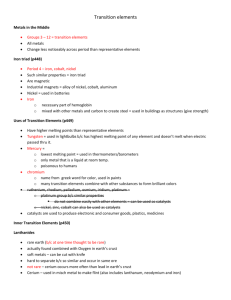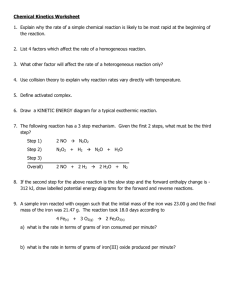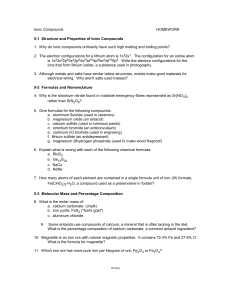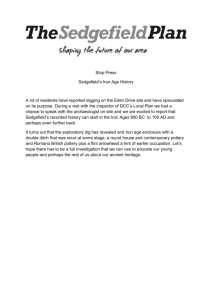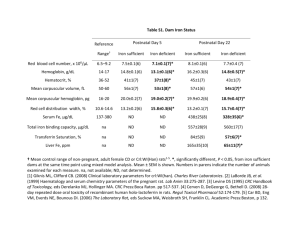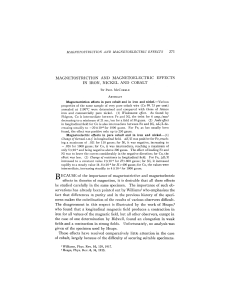Cobalt
advertisement
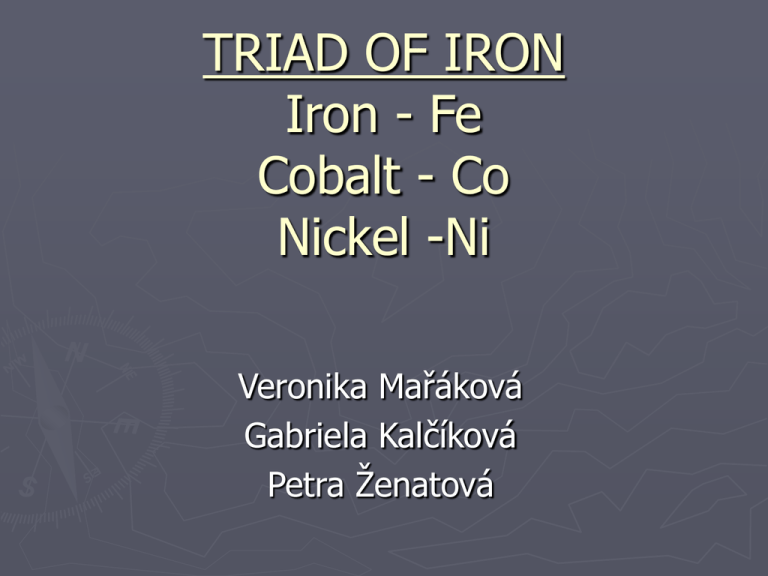
TRIAD OF IRON Iron - Fe Cobalt - Co Nickel -Ni Veronika Mařáková Gabriela Kalčíková Petra Ženatová Iron - Fe * * * * * * * * * * * Atomic Number: 26 Atomic Mass: 55.845 Melting Point: 1535.0 °C Boiling Point: 2750.0 °C Crystal Structure: Cubic Density 293 K: 7.86 g/cm3 Color: Silvery Date of Discovery: Known to the ancients Discoverer: Unknown Name Origin: Latin Symbol Origin: From the Latin word ferrum (iron) Obtained From iron ores ► Hematite ► Magnetite ► Pyrite Compounds ►2 major series of chemical compounds the bivalent iron (II) the trivalent iron (III) For example: ► FeSO4.7H2O ferrous sulfate heptahydrate (green vitriol) ► FeCl3.6H2O ferric chloride hexahydrate ► Fe2O3 ferric oxide ► KFe2(CN)6 prussian blue Using hemoglobin * Using steel industry Forms of iron iron 4-5% carbon, sulfur, silicon, phosphorus ► Cast iron 2-4%carbon, 1-6% silicon, manganese ► Carbon steel 0,5 and 1,5% carbon, manganese, ► Pig sulfur, phosphorus, silicon iron 0,2% carbon ► Alloy steels chromium, vanadium, molybdenum, ► Wrought nickel, tungsten ► Iron (III) use in magnetic storage in computers Vocabulary alloy – slitina pig iron – surové železo cast iron – litina wrought iron – tvářené železo alloy steels – legovaná ocel blast furnace – vysoká pec Cobalt Characteristics ► Name: cobalt ► Symbol: Co ► Atomic number: 27 ► Atomic weight: 58.933200 ► Group number: 9 ► Period number: 4 ► Block: d-block Number of Energy Levels: 4 First Energy Level: 2 Second Energy Level: 8 Third Energy Level: 15 Fourth Energy Level: 2 Physical and chemical characteristics ► Standard state: solid at 298 K ► Colour: lustrous, metallic, greyish tinge ► Classification: Metallic ► Availability: cobalt is available in many forms including pieces, powder, rod, and wire. ► Reactivity :is lower then Fe,doesn´t corrode, dissolves in inorganic acids,reacts at high temperature with oxygen Appaerance and Application ► Cobalt is present in meteorites. Ore deposits are found in Zaire, Morocco and Canada ► Compounds of cobalt were used to colorate glass ► Cobalt is used for production of special steel Dictionary ► available-dosažitelný ► rod-prut ► wire-drát ► ore-ruda ► deposits-uloženy Sources:www.periodictable.com ,www.answears.com,extension inorganic chemistry Nickel ► Chemical Symbol: Ni ► Atomic Number: 28 ► Weight: 58.71 ► Melting Point: 1 455 ºC ► Boiling Point: 2 730 ºC ► Density: 8.90 g/cm3 at 25 ºC ► Electron configuration: [Ar] 3d8 4s2 Nickel ► The name nickel comes from the German word "kupfernickel" meaning Devil's copper or Old Nicholas's copper. ► Nickel was used by the Chinese in naturally occuring nickel-copper alloys for over two thousand years. ► In 1751 Swedish chemist, Alex Frederic Constedt, isolated the metal from niccolite ore. Chinese nickel-copper candlesticks Ni – chemical properties ► in period 4, group 10 of the period. table ► is transition metal ► in compounds is almost exclusively in the +2 oxidation state ► many nickel compounds dissolve fairly easy in water and have a green color ► it forms compounds (↑t) with B, Si, P, S and halogens Ni – physical properties and uses ► silvery white, magnetic metal, hard, corrosion resistant, high electrical and thermal conductivities ► is alloyed with other metals to improve their strength and resistance to corrosion ► is also used to manufacture some types of coins and batteries ► a single kilogram of nickel can be drawn into 300 kilometers of wire Ni – dictionary Devil's copper – ďáblova měď Naturally occuring – vyskytující se v přírodě Candlestick - svícen Niccolite ore – NiAs ruda Transition metal – přechodný kov Coins - mince Wire - drát Stainless steel – nerezavějící ocel Dissolve fairly easy – rozpouští vcelku lehce The Big Nickel in Sudbury, Ontario,

